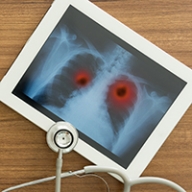If You Won’t Quit Smoking, At Least Watch for These Lung Cancer Symptoms
Medically Reviewed by Vinod K. Jona, MD
Let’s be honest: Smoking causes lung cancer.
About 90% of lung cancers are caused by smoking. The more cigarettes you smoke a day and the younger you started smoking, the greater your risk of lung cancer. In South Carolina, lung cancer is the leading cause of cancer deaths – accounting for more victims each year than breast, prostate and pancreatic cancer combined.
Smoking pipes and cigars also causes cancer. In fact, cigars contain more cancer-causing substances, tar and toxins than cigarettes.
“The best way to reduce your risk lung cancer is to quit smoking,” says McLeod Pulmonologist Dr. Vinod Jona. “For some people, it’s easy; they’ve claimed to have quit smoking dozens of times. But seriously, for many people, it’s very difficult to break the addictive habit. If you know someone like that – or if that’s you – here are symptoms to watch for.”
When lung cancer first develops, there may be no pain or visible symptoms. As the cancer worsens, the following signs may appear:
- A cough that won’t go away – even after 2 or 3 weeks
- Wheezing, hoarseness or shortness of breath
- Repeated bouts of bronchitis or pneumonia
- Chest pain that gets worse with coughing, laughing or deep breathing
- Coughing up blood or rust-colored spit
Signs of more advanced lung cancer include:
- Swallowing difficulty
- Eyelid drooping
- Facial paralysis
None of the symptoms by itself guarantees that you have lung cancer. But, if you have a symptom, you need to see your personal physician. When you do, here’s what will happen.
Imaging Tests
Chest X-rays may be taken right in your doctor’s office. If the doctor sees something suspicious, you may need more tests.
CT (or CAT) Scans are more likely than an X-ray to show lung tumors, in addition to revealing the exact location, size and position of the tumors. The CT can also show if the cancer has spread to the lymph nodes (metastasized).
Positron Emission Tomography (PET) Scans may also be used to map the spread of any cancer.
Tissue Tests
Sputum Samples. The doctor may take a sample of the mucous you cough up from your lungs.
Bronchoscopy uses a lighted fiber optic tube to examine the throat and windpipe.
A Needle Biopsy uses a syringe, cells and small fragments of tissue are withdrawn from the mass being examined.
These are the most common tests. However, other studies may use ultrasound, sample liquid near the lung or require minor incisions to collect larger tissue samples.
ACTION YOU CAN TAKE
If you are going to smoke, you are risking lung cancer. So, keep an eye out for the obvious symptoms. See your doctor right way if you sense something is wrong.
Based on a study of 53,000 former or active smokers, the United States Preventive Services Task Force recommended screening for lung cancer using a low-dose CT in a specific group of patients.
For more information on the McLeod Lung Cancer Screening Program, click here or call 843-777-5640.
Sources include: McLeod Health, Centers for Disease Control & Prevention, National Cancer Institute, National Institutes of Health, National Health Service UK, American Cancer Society, SC Department of Health and Environmental Control
-
McLEOD REGIONAL MEDICAL CENTER FLORENCE
843-777-2000 -
McLEOD DARLINGTON
843-777-1100 -
McLEOD DILLON
843-774-4111 -
McLEOD LORIS
843-716-7000 -
McLEOD SEACOAST
843-390-8100 -
McLEOD CHERAW
843-537-7881 -
McLEOD CLARENDON
803-433-3000



-
McLEOD REGIONAL MEDICAL CENTER FLORENCE
843-777-2000 -
McLEOD DARLINGTON
843-777-1100 -
McLEOD DILLON
843-774-4111 -
McLEOD LORIS
843-716-7000 -
McLEOD SEACOAST
843-390-8100 -
McLEOD CHERAW
843-537-7881 -
McLEOD CLARENDON
803-433-3000
 Find a Doctor
Find a Doctor  Locations
Locations  Services
Services 